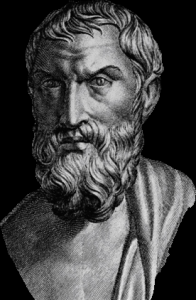Welcome to NewEpicurean.com!
Thank you for visiting! Many today are rediscovering that the ancient flowering of Greco-Roman civilization was in large part generated by a fascinating and popular intellectual movement. This movement was led by Epicurus, a man who – all but alone – stood up against and put to flight the religious and philosophic tyranny of his day. After hundreds of years the Epicurean movement was eventually suppressed, but like the elements, its truths could not be destroyed.  The insights of Epicurus remain just as fresh and just as valid today as ever, and they remain available to provide a foundation of strength and happiness for any who seek it out. If you are a new visitor, please be sure to check out our welcome videos above, especially our introductory summary: Foundations of Epicurean Philosophy. Be sure to review our presentation of Epicurus’ own summary of his philosophy, his “Letter to Herodotus.” Also, we have To The Hearts In Darkness: a Brief Introduction to the Philosophy of Epicurus. For a summary at an elemental level, see our two short poems “Thus Purred Catius Cat” and “Catius Cat And the Forty Mice.” These videos are organized for easy reference on our Youtube Video Page. We also have a set of answers to Frequently Asked Questions.
The insights of Epicurus remain just as fresh and just as valid today as ever, and they remain available to provide a foundation of strength and happiness for any who seek it out. If you are a new visitor, please be sure to check out our welcome videos above, especially our introductory summary: Foundations of Epicurean Philosophy. Be sure to review our presentation of Epicurus’ own summary of his philosophy, his “Letter to Herodotus.” Also, we have To The Hearts In Darkness: a Brief Introduction to the Philosophy of Epicurus. For a summary at an elemental level, see our two short poems “Thus Purred Catius Cat” and “Catius Cat And the Forty Mice.” These videos are organized for easy reference on our Youtube Video Page. We also have a set of answers to Frequently Asked Questions.
There are many places on the internet where other philosophies can be studied, but few if any which are dedicated exclusively to Epicurus. We work hard to keep both this page and our forum firmly consistent with classical Epicurean philosophy. If you find page errors that should be corrected, please email us.
In addition to EpicureanFriends.com, we invite you to subscribe to our free weekly podcast about Epicurean Philosophy entitled LucretiusToday. Each week our panel of podcasters brings to you excerpts from the ancient Epicurean texts and attempts to relate them to modern understanding and daily life. For a list of episodes and show notes click here.
The purpose of this website is to promote the study of the philosophy of Epicurus.
Epicurus taught that it is essential to our happiness to pursue the study of Nature. An understanding of basic principles of Nature leads us to conclude that the universe is eternal, that we have free will, that we are not predestined by “Fate,” that we have no need to fear punishment or reward from capricious gods either now or after death, that we can find all the truth that is necessary for us to find, that happiness is possible, and that the requirements of happy living are few and simple. And these truths are not matters of speculation or reserved for some future existence – these are the ground rules of the only life available to us – the one we live now.
Armed with confidence in these conclusions, we are freed from the unnecessary fears and anxieties peddled by false priests and false philosophers. Beguiled no longer by “virtue” or “abstract reason” or “the will of the gods,” we are free to follow the guide Nature provided to us, Divine Pleasure. And our confidence that these conclusions are correct is not a matter of faith – in Epicurus or anything or anyone else. Our confidence is grounded in the proper use of the faculties Nature herself gave to us, by use of the method of true reason taught by Epicurus.
These are the matters that this web site will explore. This exploration is directed to normal, everyday people who wish to live happily – it is not directed to academics or historians. Academics and historians are welcome as well, but the philosophy of Epicurus was developed for ordinary people, and for far too long it has been hidden away from those who need it most. Establishment figures can be expected to continue to reject Epicurus just as they have for thousands of years. Epicurus’ philosophy gives no quarter to imposition or manipulation, and gives no route to fame or riches or power over others. The path of Epicureanism will always be the one to which Nature calls, but only those who are willing to listen to her, rather than to the crowd, will follow.
The attitude of Thomas Jefferson two hundred years ago was much the same as Epicurus two thousand years ago, and so the same is the attitude embraced by this website: “I swear eternal hostility toward every form of tyranny over the mind of man.”
